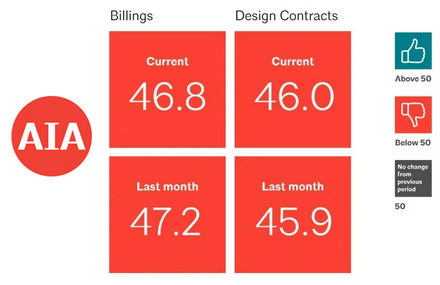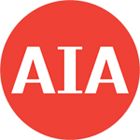AIA Billings Index Declines In June But New Project Inquiries Up

Washington, DC – The AIA/Deltek Architecture Billings Index (ABI) remained in negative territory in June with a score of 46.8, down from 47.2 in May as more firms reported a decrease in billing. The index is compiled monthly by the American Institute
of Architects to gauge the business climate for design firms at both regional and national levels.
Inquiries into new projects increased for the second consecutive month and grew at the strongest pace since last fall with a score of 53.6, indicating clients are starting to send out RFPs and initiate conversations with architecture firms about potential
projects after a lull since mid-winter. These inquiries do not necessarily translate into actual projects, as the value of newly signed design contracts declined for the 16th consecutive month in June. It is unlikely that firm billings will return
to positive territory until the value of new design contracts also starts to increase again.
“Business conditions were soft nationwide in June, with a slight billing increase in the South for the first time since October,” said Kermit Baker, PhD, AIA Chief Economist. “Other regions saw declining billings, though at a slower
pace. While all specializations experienced softer billings, the decline slowed for commercial/industrial and institutional firms. Multifamily firms faced the weakest conditions, with further declines,”
Key ABI highlights for June include:
• Regional averages: South (50.6); Northeast (46.5); Midwest (45.7); West (45.8)
• Sector index breakdown: institutional (49.2); commercial/industrial (47.4); mixed
practice (firms that do not have at least half of their billings in any one other category) (45.5); multifamily residential (43.8)
• Project inquiries index: 53.6
• Design contracts index: 46.0
The regional and sector categories are calculated as three-month moving averages and may not always average out to the national score.
About The American Institute Of Architects
 For over 150 years, members of the American Institute of Architects have worked with each other and their communities to create more valuable, healthy, secure, and sustainable buildings and cityscapes. Members adhere to a code of ethics and professional conduct to ensure the highest standards in professional practice. Embracing their responsibility to serve society, AIA members engage civic and government leaders and the public in helping find needed solutions to pressing issues facing our communities, institutions, nation and world. For more information, visit www.aia.org.
For over 150 years, members of the American Institute of Architects have worked with each other and their communities to create more valuable, healthy, secure, and sustainable buildings and cityscapes. Members adhere to a code of ethics and professional conduct to ensure the highest standards in professional practice. Embracing their responsibility to serve society, AIA members engage civic and government leaders and the public in helping find needed solutions to pressing issues facing our communities, institutions, nation and world. For more information, visit www.aia.org.